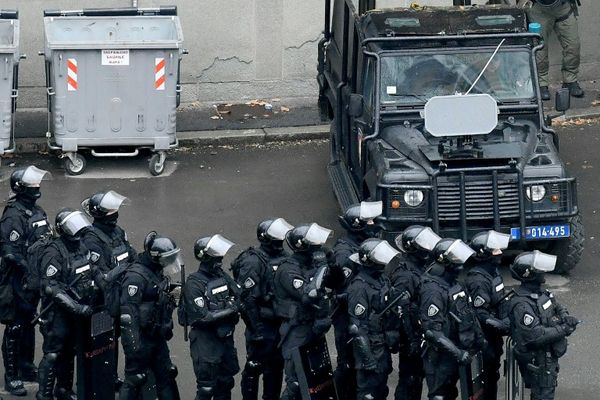
The former British spy chief Sir Richard Dearlove has described the Pine Gap surveillance base in central Australia as “hugely important” to western intelligence collection about China’s “rather alarming” activities.
Intelligence officials are usually tight-lipped on exactly what the joint US-Australian facility is used for, but the former head of MI6 said Pine Gap was “a sophisticated listening post, all right, and a lot else besides”.
“You’ve got the massive installation, which is partly NSA [US National Security Agency], at Pine Gap and that’s really important because, well, it’s an intercept intelligence site,” Dearlove said on the global affairs podcast One Decision.
“And it’s hugely important strategically to the US and to the western alliance because of its position, its geographical location.”
He explicitly confirmed the western interest in Beijing’s activities, saying Pine Gap – the installation near Alice Springs in the Northern Territory – was “crucial to, let’s say, western coverage of China”.
“I don’t think I should go into detail about what it actually does, that would be indiscreet,” Dearlove added. More broadly, he said, Australia had “a very sophisticated intercept capability”.
The former head of the British Secret Intelligence Service made the comments during a podcast conversation with the former Australian foreign affairs minister Julie Bishop, who said Australia’s relationship with China currently was “tense”.
Australia is a member of the Five Eyes intelligence sharing alliance, which also includes the US, the UK, Canada and New Zealand.
The presence of the Pine Gap facility in Australia has from time to time attracted controversy. A trove of NSA documents leaked by Edward Snowden indicated the site “plays a significant role in supporting both intelligence activities and military operations”.
The ABC reported in 2017 that the facility – officially known as Joint Defence Facility Pine Gap - provided detailed geolocation intelligence to the US military. That prompted some legal observers to question the site’s potential role in supporting deadly US drone strikes in the Middle East.
Bishop said China had been “much more assertive” and “indeed aggressive in some instances” since Xi Jinping became president.
Some of China’s wolf warrior diplomacy had been “startling”, Bishop contended, and Beijing had “sought to make an example of us” since 2020 by introducing steep tariffs or trade actions against Australian export sectors such as wine, beef and barley.
Bishop said Australia was in the “rather unusual situation that our major trading partner, China, is in serious competition with our major strategic defence and intelligence ally, the United States”.
In the podcast interview, Dearlove asked Bishop whether it would be possible to “square this circle” in the long term.
Dearlove cited not only the Pine Gap installation but also Australia’s strategic alliance with the US, the rotation of US marines through Darwin, and the Aukus deal for the US and the UK to help Australia acquire at least eight nuclear-powered submarines.
“And all of this is, you could argue, [is] very provocative to the Chinese,” Dearlove said. “And at the same time, your economy or aspects of your economy, are absolutely totally tied to the Chinese market.”
Bishop agreed that it was “a balancing act” and called for Australia and China to “reestablish a more constructive dialogue”.
“It will be interesting to see how Xi Jinping is able to maintain this grip on power,” she said.
“I’ve not yet seen evidence that he’s losing it, but China’s future is facing many hurdles, many challenges. Its inexorable rise is not inevitable. I think there are many bridges to cross before China could be seen as a superpower in the nature of the United States.”
Bishop, who was foreign minister from 2013 to 2018, said Australia and other countries in the region were “looking for more US leadership, not less”. She contended that very few countries “would want to live in a region where the Chinese government was calling the shots”.
Dearlove called on the west to “develop a new security regime which copes with China’s presence as a superpower”.
But while saying he found China’s insistence on rewriting global rules as “rather alarming”, Dearlove also made an emphatic plea for Australia and other western countries to continue to seek dialogue with Beijing.
“I do firmly believe in talking, not just to one’s competitors, but to one’s enemies as well, and engaging in dialogue, and having some sort of bilateral infrastructure which allows for the treatment and discussion of problems on an almost constant basis,” he said.
The One Decision podcast, which is co-hosted by Dearlove and the journalist Julia Macfarlane, was recorded in December but released on Thursday. It is produced by the US-based communications firm Global Situation Room.







